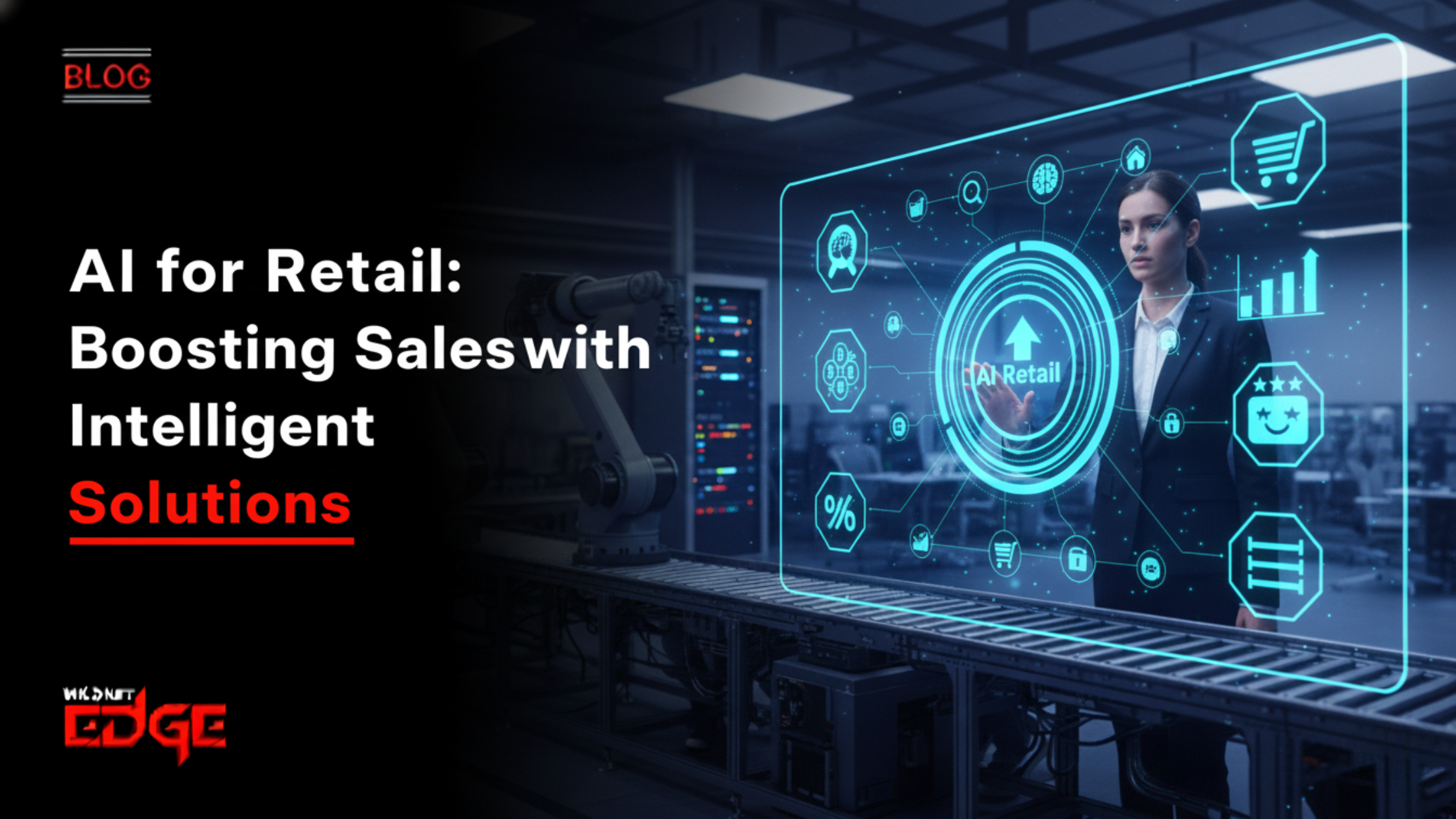Introduction:
Are you struggling to keep customers engaged in your retail business? In today’s fast-paced market, simply having a great product isn’t enough. You need to provide an experience that captivates and retains customers. This is where AI for retail comes into play. By leveraging intelligent recommendation engines and AI shopping assistants, you can transform the shopping experience, drive sales, and keep your customers coming back for more.
Recommendation Engine Development
One of the cornerstones of AI for retail is effective recommendation engine development. These engines analyze vast amounts of data to deliver personalized shopping experiences that can significantly boost sales.
Importance of Data Collection and Analysis
The first step in developing an effective recommendation engine is data collection. Retailers must gather data from various sources, including customer purchase history, browsing behavior, and demographic information. This data is essential for understanding customer preferences and predicting future behavior.
Retailers can use tools like Google Analytics or Shopify Analytics to collect and analyze this data. Understanding customer behavior allows retailers to create tailored experiences that resonate with their audience.
Machine Learning Algorithms Used in Recommendation Systems
Once data is collected, machine learning algorithms come into play. There are several algorithms commonly used in recommendation engines:
- Collaborative Filtering: This method suggests products based on the preferences of similar users. If User A and User B have similar tastes, then User A might receive recommendations based on User B’s purchases.
- Content-Based Filtering: This approach recommends items similar to what the user has previously liked or purchased, focusing on the attributes of the products themselves.
- Hybrid Systems: Combining both collaborative and content-based filtering can yield even better results, offering a more balanced approach to recommendations.
Case Studies of Successful Recommendation Engine Implementations
Many retailers have successfully implemented recommendation engines to drive sales. For instance, Amazon uses a sophisticated recommendation engine that accounts for user behavior and purchase history, leading to increased sales and improved customer satisfaction.
Another notable example is Netflix, which utilizes AI to recommend shows and movies based on user viewing habits. This strategy not only keeps users engaged but also fosters a sense of loyalty to the platform.
The Role of AI Shopping Assistants
AI shopping assistants are revolutionizing customer interactions and streamlining the purchasing process. These intelligent solutions enhance the overall shopping experience by providing real-time support and personalized recommendations.
Features of AI Shopping Assistants
AI shopping assistants come equipped with various features that enhance customer service:
- Chatbots: These virtual assistants can answer customer inquiries 24/7, offering instant support for common questions about products, availability, and more.
- Voice Assistants: Integrating voice technology allows customers to interact with the shopping platform using natural language, making the process seamless and intuitive.
- Personalized Recommendations: By analyzing user data, AI shopping assistants can suggest products tailored to individual preferences, improving the likelihood of conversions.
Benefits of Using AI Assistants in Retail Environments
The advantages of utilizing AI shopping assistants are significant:
- Increased Efficiency: AI assistants can handle multiple customer inquiries simultaneously, freeing up human staff to focus on more complex tasks.
- Enhanced Customer Experience: With immediate responses and personalized recommendations, customers are more likely to have a positive shopping experience, leading to higher satisfaction and loyalty.
- Cost Savings: By automating routine inquiries, retailers can reduce operational costs associated with customer service.
Real-World Examples of AI Shopping Assistants in Action
Retail giants like Sephora and H&M have effectively implemented AI shopping assistants. Sephora’s Virtual Artist tool allows customers to try on makeup virtually, providing personalized recommendations based on their preferences. H&M’s chatbot helps customers find clothing items based on their style choices and preferences, enhancing user engagement and driving sales.
Enhancing Customer Experience with AI
AI can significantly enhance the customer experience in retail by creating a more personalized and engaging shopping environment.
Tailoring Product Recommendations Based on User Behavior
By analyzing user behavior, retailers can tailor product recommendations to meet individual needs. For instance, if a customer frequently purchases athletic wear, an AI system can prioritize these items in their recommendations, increasing the likelihood of a purchase.
Utilizing AI for Inventory Management and Personalized Promotions
AI can also optimize inventory management by predicting demand trends. By analyzing historical sales data, AI can forecast which products are likely to sell well, allowing retailers to stock accordingly and reduce waste.
Additionally, AI can facilitate personalized promotions, delivering targeted discounts or offers based on a customer’s shopping habits. This level of personalization can drive higher conversion rates and customer retention.
The Impact of AI on Customer Satisfaction and Loyalty
The integration of AI in retail not only enhances customer satisfaction but also fosters loyalty. When customers receive tailored recommendations and personalized service, they feel valued and understood, leading to repeat business. Retailers leveraging AI can create stronger emotional connections with their customers, which is crucial in today’s competitive landscape.
Future Trends in AI for Retail
As technology continues to evolve, so do the possibilities for AI in retail. Here are some emerging trends that retailers should keep an eye on:
The Rise of Augmented Reality (AR) and Virtual Reality (VR) in Shopping
AR and VR technologies are transforming the shopping experience. Retailers can create immersive environments where customers can visualize products in their own spaces before making a purchase. This technology not only enhances engagement but also reduces return rates.
Predictive Analytics and Its Role in Inventory and Sales Forecasting
Predictive analytics powered by AI can help retailers anticipate market trends and customer demands. By analyzing vast data sets, retailers can make informed decisions about inventory and marketing strategies, ultimately driving sales.
Integrating AI with IoT for Smarter Retail Environments
The integration of AI with the Internet of Things (IoT) is paving the way for smarter retail environments. Smart shelves, for example, can track inventory levels in real-time and notify staff when restocking is needed. This level of automation can streamline operations and enhance the customer experience.
Conclusion:
In summary, integrating AI for retail through intelligent recommendation engines and AI shopping assistants can significantly enhance customer experiences and drive sales. With the right strategies, your retail business can thrive in this competitive landscape. Trust WildnetEdge to provide the expertise and solutions you need to implement these innovations effectively. Ready to elevate your retail game? Let’s get started!
FAQs
Q1: How do recommendation engines improve sales in retail?
Recommendation engines analyze customer data to suggest personalized products, increasing the likelihood of purchases.
Q2: What are the benefits of using an AI shopping assistant?
AI shopping assistants provide instant support, personalized recommendations, and enhance the overall shopping experience.
Q3: How can AI enhance customer loyalty in retail?
By offering personalized experiences and relevant recommendations, AI fosters a deeper connection between retailers and customers, boosting loyalty.
Q4: What technologies are involved in developing recommendation engines?
Common technologies include machine learning algorithms, big data analytics, and collaborative filtering methods.
Q5: How can retailers prepare for the future of AI in shopping?
Retailers should invest in technology, train staff, and stay updated on trends to effectively leverage AI and improve their offerings.

Nitin Agarwal is a veteran in custom software development. He is fascinated by how software can turn ideas into real-world solutions. With extensive experience designing scalable and efficient systems, he focuses on creating software that delivers tangible results. Nitin enjoys exploring emerging technologies, taking on challenging projects, and mentoring teams to bring ideas to life. He believes that good software is not just about code; it’s about understanding problems and creating value for users. For him, great software combines thoughtful design, clever engineering, and a clear understanding of the problems it’s meant to solve.
 sales@wildnetedge.com
sales@wildnetedge.com +1 (212) 901 8616
+1 (212) 901 8616 +1 (437) 225-7733
+1 (437) 225-7733















 ChatGPT Development & Enablement
ChatGPT Development & Enablement Hire AI & ChatGPT Experts
Hire AI & ChatGPT Experts ChatGPT Apps by Industry
ChatGPT Apps by Industry ChatGPT Blog
ChatGPT Blog ChatGPT Case study
ChatGPT Case study AI Development Services
AI Development Services Industry AI Solutions
Industry AI Solutions AI Consulting & Research
AI Consulting & Research Automation & Intelligence
Automation & Intelligence















